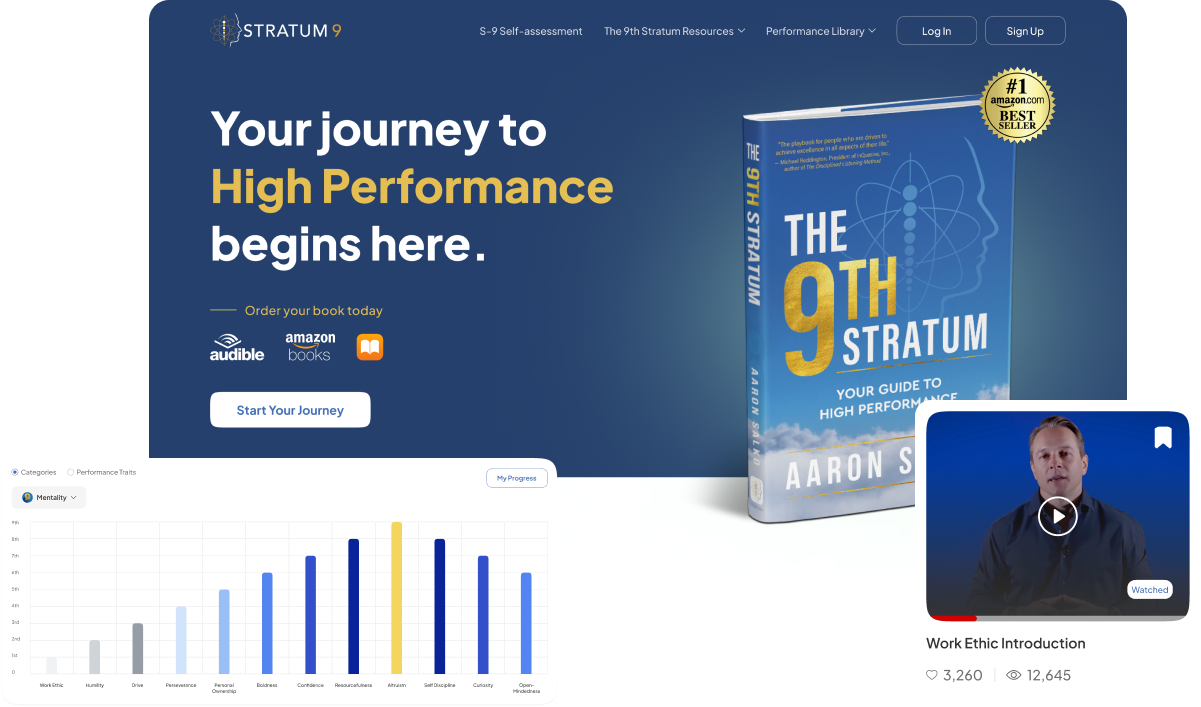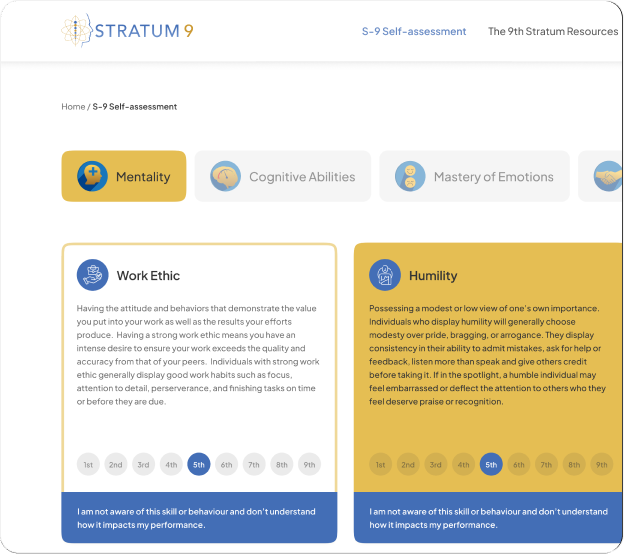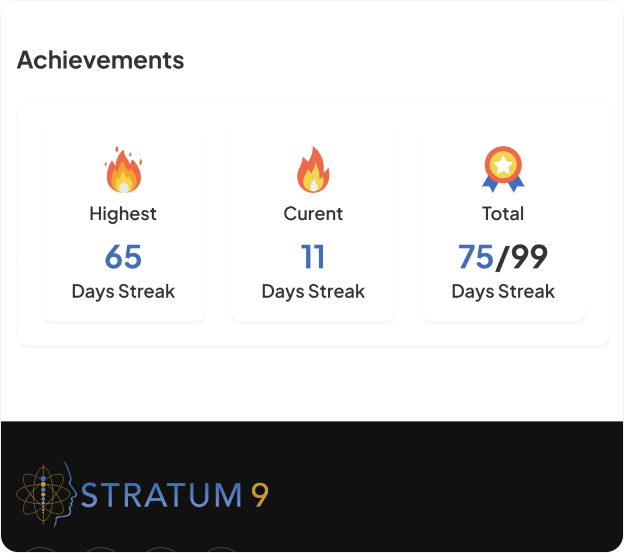Basic AI Chatbot Pricing: A simple chatbot that can answer questions about a product or service might cost around $10,000 to develop.
Read More
Stratum 9 started as a book on high performance, named “The 9th Stratum”. We transformed its principles into an interactive App and website, where users can track their daily routine to improve their skills through assessment, creating goals, and viewing experts guidance videos.

For Stratum 9, the goal was to bring the teachings of an influential book on personal growth into an interesting digital experience. The focus of the book was 45 essential interpersonal skills to help people become high performers in the skill they’re doing good and that became the center of the project.
To make the platform content available and engaging, we developed personalized assessments, goal tracking, friends messaging groups, and gamified learning elements. It was a solution to make the user's journey, from novice to expert, easy with the help of expertly created content, community participation, and actionable insights.
The book’s core values resulted in Stratum 9, a performance improvement platform that transformed the book’s core concept into an interactive lifelong learning and personal improvement tool available on iOS, Android, and web.

Assessments take a more tailored approach, evaluating each user’s proficiency in 45 different interpersonal skills, and offering a tailored growth path. This feature allows users to know their current level status and see which area needs improvement for them to reach their personal development goals.
For instance, badges and positive reinforcement gamification motivate users to progress through what we regard as skill levels. It’s fun and it’s rewarding, and the reward keeps the platform’s users engaged, and constantly growing.


Users can see leaderboards where they can check who among the community is doing great in the 5 daily wins. The leaderboard can be filtered for weekly, monthly, and yearly timeframes.
 Performance Library
Performance Library
 Daily Wins
Daily Wins
 Progress Tracking
Progress Tracking
 Expertly Crafted Content
Expertly Crafted Content
 Actionable Insights
Actionable Insights
 Skill Development Plans
Skill Development Plans
 Interactive Learning
Interactive Learning
 Skill Comparison
Skill Comparison
 Expert Guidance
Expert Guidance
 User Progression Badges
User Progression Badges
 Positive Reinforcement
Positive Reinforcement
Here are some challenges that our team encountered while working on the project:
Challenges
Presenting 45 Interpersonal Skills Clearly
Navigating through this large number of skills into an intuitive structure didn’t come easy.
The trick was to present detailed information simply so that users didn’t feel overwhelmed.
Creating Customized Assessments
Personalized assessment of each skill involved a lot of careful design to accommodate different user levels and much work in developing the content for analysis.
The challenge with the assessments was that they had to be insightful and engaging, without asking generic or repetitive questions.
SOLUTIONS
Created a simple structure with various tiers to understand interpersonal skills.
Presented skills using visual aids and categories to make them simpler.
These modular assessments range from very difficult to very easy and are created to cater to different user levels.
Enhanced assessments with incorporated feedback loops for more engagement.
Challenges
Real-Time Notifications
From maintaining a fast, responsive interface to incorporating dynamic content such as gamified elements and assessments, the whole thing was always an ongoing optimization.
The key focus was to reduce loading times for an interactive platform that had many features.
Handling Scalability Issues
Scalability is also a challenge when you try to design a platform that will scale to handle an increasing user base while maintaining performance and reliability.
Smooth user experience during peak traffic time requires not only effective backend and infrastructure but also good experience by the user.
SOLUTIONS
Implemented caching and content delivery network (CDN) to improve performance and reduce load times.
Reduced resource-heavy elements and optimized platform components.
Leveraged top-notch cloud-based infrastructure to ensure scalability.
Managed to balance load without crippling the front-end, using load balancing and backend configuration.
React is a free and open-source front-end JavaScript library for building user interfaces or UI components. It allows developers to reuse the components built for the same functionality, reducing the development effort and ensuring flawless performance.
Next.js is an open-source web development framework created by the private company Vercel providing React-based web applications with server-side rendering and static website generation.
Socket.IO is a real-time communication library for web applications. It allows you to create applications that can send and receive data in real time, even if the user is not on the same page.
Node.js is based on Google’s V8 JavaScript engine that compiles the code directly into the machine code, improving the speed and performance of the platform. In addition, it delivers better efficiency and overall developer productivity through code sharing and reusability.
Unlike traditional database systems that offer data management through tables and rows, MongoDB allows data management fields with the help of NoSQL. Resulting in no lag while handling more massive datasets.
Amazon Web Services, Inc. is a subsidiary of Amazon that provides on-demand cloud computing platforms and APIs to individuals, companies, and governments, on a metered, pay-as-you-go basis. Oftentimes, clients will use this in combination with autoscaling.
With experience building Stratum 9 type platforms, we can help turn your idea into a reality.
Our website require some cookies to function properly. Read our privacy policy to know more.